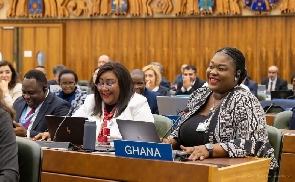The Council of the International Union for the Protection of New Varieties of Plants (UPOV) held its fifty-sixth ordinary session on October 28, 2022, under the chairmanship of Mr. Marien Valstar of the Netherlands. The purpose of UPOV is to provide and promote an effective system of plant variety protection, with the aim of encouraging the development of new varieties of plants, for the benefit of society. UPOV has 78 members covering 97 States. The Republic of Ghana deposited its instrument of accession to the 1991 Act of the UPOV Convention on November 3, 2021, and became bound by the 1991 Act on December 3, 2021 as the 78th member . On the occasion of the participation for the first time in the UPOV Council in October 28th 2022, as a member, Ms. Diana Asonaba Dapaah, Deputy Attorney General and Deputy Minister of Justice of Ghana led Ghana’s delegation. In her statement to the Council, she shared some of the reasons why it is important for Ghana to be a UPOV member. That Agriculture is one of the important sources of livelihood in Africa and particularly so in Ghana. That Ghana recognizes the progress made in breeding activities at the national level by research institutions and private breeders. Breeding improved varieties is key to meeting society needs in the agricultural sector. Furthermore, Ghana recognizes the UPOV System as offering an effective protection of new varieties of plants. That the Government is committed to improve breeding activities and develop the seed sector . It has in place a protection system for breeders and intend to use agriculture to provide for food and jobs in the rural sector and farming communities. Ghana’s accession to the UPOV Convention to become a UPOV Member is not only opportune but critical to Ghana’s food and nutrition security as well as meeting its national development goals. Also, the Council members took a positive decision on the conformity of the Draft Law on the Protection of Varieties of Plants of Armenia with the provisions of the 1991 Act of the UPOV Convention, which allows Armenia, once the Draft Law is adopted with no changes and the Law is in force, to deposit its instrument of accession to the 1991 Act. The meeting discussed topical issues affecting agriculture and the need for improved seeds globally. Such as the role of plant breeding and plant variety protection in enabling agriculture to mitigate and adapt to climate change , for which Ghana presented a paper. In his concluding remarks, The President of the Council of UPOV , Mr. Marien Valstar, reminded member states that Climate change is increasingly affecting everyone around the world: farmers, breeders and consumers. Effects are biotic (new pests and diseases) and abiotic (heat, drought, rain, seasonal changes). Consequently, a range of strategies is needed to respond to the challenges. Plant breeding has a vital role to play in these strategies; farmers need new plant varieties to adapt to climate change but also to sustainably increase productivity in order to minimize climate change. Plant breeding is a long-term process that requires long-term investment from public institutions and from private companies. Plant breeders need a regulatory environment that promotes innovation and supports the conservation and utilization of genetic resources. The UPOV system enables plant breeders to provide farmers with the varieties they will need to feed the world in the face of climate change. Ghana had fruitful deliberations with the member states of UPOV and will embark on a nationwide awareness to ensure that breeders and farmers take advantage of the plant variety system to the benefit of all.













